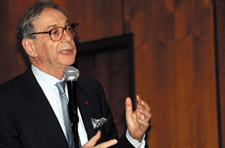According to Lionel Stoleru, the battle between church and state is not a point of debate only in the United States.
According to Lionel Stoleru, the battle between church and state is not a point of debate only in the United States.
Stoleru’s lecture, “Democracy and Religion: The French Experience,” was sponsored by the Biever Guest Lecture Series, l’Alliance Française de la Nouvelle-Orléans and the Department of Modern Foreign Languages and Literatures.
According to Stoleru, the separation of church and state in France has been a long and arduous battle.
“It is a danger to join God and state for some of us,” said Peter S. Rogers, S.J., a French professor in the Department of Modern Foreign Languages and Literature. “Religion and democracy is the question [tonight].”
Stoleru’s lecture spanned the history of French government from the era leading up to the French Revolution to present day France.
In the time prior to the Republic, France’s government was composed of three pillars: the king and nobles, the army and the Catholic Church. The French welcomed the pope in Avignon and joined the Crusades, killing hundreds of thousands of Muslims, Stoleru said.
“They had done nothing,” Stoleru said. “But they were not Catholic, so they died.”
In 1789, the French Revolution erupted, killing the power of the monarchy and the Catholic Church with the guillotining of King Louis XVI. The “Declaration of the Rights of Man,” France’s constitution, created the first formal separation of church and state, declaring that “no one shall be disquieted on account of his opinions, including his religious views, provided their manifestation does not disturb the public order established by law,” Stoleru said.
According to Stoleru, the next blow to the Catholic Church’s power came with Napoleon Bonaparte, who demonstrated his power over the Church by forcing the pope to his bidding. “Napoleon forced the pope to come to Notre Dame to anoint him,” Stoleru said, “and then the Revolution stopped.”
The battle between church and state did not arise again until the fall of Napoleon III and the subsequent creation of the French Republic in 1870.
“Relations between the church and state were highly bad,” Stoleru said. “It was a battle between the anti-religious and the religious, namely the Catholics.”
The 1905 Law of Separation settled the battle of church and state once and for all, requiring a complete separation between church and state. Stoleru said that the Law of Separation would still be unanimously passed today if it were put to the French government for a vote because it is no longer seen as a battle between the anti-religious and the Catholics but rather as an organ








